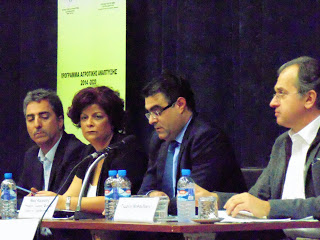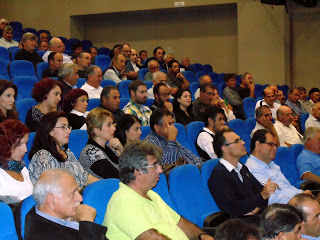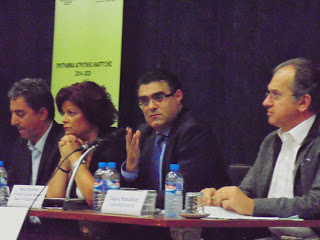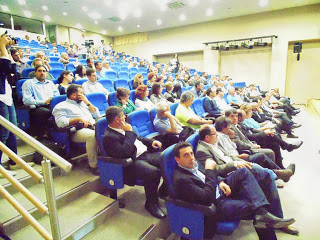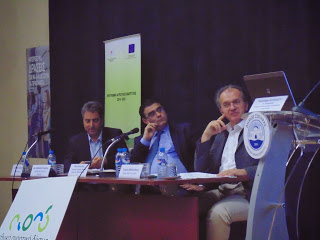The Municipality of Sotira was visited by the Minister of Agriculture, Natural Resources and Environment, Mr. Nikos Kougialis on Thursday, October 31, 2013, in a public discussion with farmers on: "The revised EU Common Agricultural Policy, New approaches to innovation and development" .
The event took place at the Municipal Theater Sotira, on the occasion of the European Year of Citizens 2013, and was organized by the Office of the European Parliament in Cyprus, the Delegation of the European Commission in Cyprus, the Press and Information Office, in cooperation with the Ministry of Agriculture, Natural Resources and Environment and the Municipalities of Sotira, Paralimni, Deryneia and Ayia Napa.
In his statements to KYPE, the Mayor Sotiras, Mr. George Takkas, praised the work of the Ministry of Agriculture, as well as the European Commission and the European Parliament in Cyprus for the opportunity given to the rural world of Famagusta to be informed about the Revised Agricultural Policy , but also the ability to ask questions to speakers. "The Ministry of Agriculture, added Mr. Takkas, seems determined to seize the opportunities opened by the absorption of funds from the European Funds, and sets as its primary goal the relief of the Rural World."
"Both the province of Famagusta and Sotira," said Mayor Sotiras, rely heavily on agriculture and every farmer must make the most of the opportunities offered through the European Union. A typical example, he continued, is the recent submission of the file of the colocasia to the European Union as a Product with a Designation of Origin, an action which took place after the cooperation of the Municipality of Sotiras with the producers of the colocasia. The certification of the dossier will contribute, he said, to the kolokasi to offer new opportunities to young farmers, whom the Ministry of Agriculture actively supports, taking into account the fact that of the 400 new jobs created in 2013 at the initiative of the Ministry , the 220 concerned young farmers. It is particularly important, Mr. Takkas continued, the opportunity given to farmers to be informed about the benefits they have to gain from the European Union and such public debates should be continued, with the aim of training and informing the rural world about the Revised Agricultural Policy of the European Union "
The Minister of Agriculture, Natural Resources and Environment Nikos Kougialis expressed in his speech the determination of the government to make the most of the European Funds in order to fully absorb funds, to strengthen and alleviate the rural world. The Minister, after referring to the difficult times that Cyprus is going through due to the economic crisis, added that "the desire and priority of the Government is the support of the rural population and the development of the countryside. The efforts are focused both on the continuation of the implementation of the Program 2007-2013 as well as on securing as many resources as possible for the first and second pillar for our country during the next programming period ".
Our goal, he continued, "is to make the best use of the policy tools offered through the regulations and to design a policy in a way that meets the needs of our place and promotes development to the maximum extent. The strategic goal of the Ministry is to support the rural world and to improve both its income and the standard of living in the countryside through the strengthening of the primary sector, always taking into account the sustainable management of natural resources and the protection of the environment ".
A Press Release of the European Union Delegation to Cyprus states that in addition to the Minister of Agriculture, the Director of the Department of Agriculture, Dr. spoke to the farmers and answered their questions. Androulla Georgiou and the Rural Development Policy Coordinator at the European Commission George Mathioudakis. Alexandra Attalidou, Deputy Head of the European Parliament Office in Cyprus, also addressed a greeting.
Read the full speech of the Minister of Agriculture:
Dear friends and family,
It is with great pleasure that I am here with you today and seize the opportunity given by the public debate on the revised EU Common Agricultural Policy to inform you of our Ministry's vision and objectives regarding the rural economy, the implementation of the Program Rural Development 2007-2013, but also the objectives of the new Common Agricultural Policy for the period 2014-2020.
Our vision is the development of the agricultural sector to be again a factor in the reconstruction of the social and economic fabric of the countryside, as well as to ensure the quality of life on the basis of environmental protection.
Our goal is to develop agriculture, to place it on a sound scientific and professional footing and to increase its contribution to GDP. At the same time, the goal and 2nd pillar of our policy is the sustainable management of our natural resources and the protection of the environment. The realization of these goals in the most effective and efficient way, utilizing the possibilities and the funds provided to our country by the European Union, is our challenge and our continuous effort.
Unfortunately, the events of March overturned the original plans of the Government and forced us to act in the direction of managing the financial crisis. That is why we have given weight to the utilization of European funds, exhausting all possibilities to secure European resources, as well as to taking relief measures for our farmers.
Measures Taken and Actions Trammed
Our first concern was to restart the Rural Development Program (RDP) 2007-2013, the implementation of which had been suspended by the previous Government due to financial constraints, from August 2012. We achieved this by convincing the EU to increase its participation in the RDP at a rate of 50% to 85% for 2013. This means that the Agricultural Sector will be strengthened with € 40m. by the end of 2013 absorbing € 32 million from the EU. The aim was for the State to draw the largest possible resources from the EU, at a time when the liquidity of state coffers was desperately depleted and the Minister of Finance was counting every euro and was anxious that the State will meet its obligations. To date, 20m have already been paid to the beneficiaries. euros and the rest are expected to be available by the end of the year.
In addition, evaluating the configuration of the total arable land of Cyprus as it is presented in the last 5 years and with the aim of maximizing the absorption of the financial portfolio of hectare subsidies, we proceeded to reduce it from 140 thousand to 127 thousand hectares. At our request, the European Commission approved the request of Cyprus. Therefore, from 2013 onwards the overall financial portfolio will be fully absorbed.
For the year 2013, Cyprus will absorb the additional amount of € 5,5m, which would be lost. It is estimated that for the years 2008 to 2012 € 27,5m were lost. about. The total subsidy that farmers will receive will amount to € 53,5m. and will be increased by 34% per tenth, according to the CAP. The enhanced hectare subsidy will be paid in January 2014.
In order to keep the agricultural sector at a tolerable level, a series of emergency measures were taken to relieve and support farmers.
A total amount of 11 (eleven) million euros will be given to support livestock, of which 3 (three) million euros have already been paid to farmers in the form of a capital subsidy. An additional € 6,7 million has been approved by the Council of Ministers and efforts are being made to pay them immediately. Four million euros relate to head subsidies to farmers and 2,7 million in compensation to potato growers for the losses they suffered in 2010.
In addition, to make the agricultural sector more competitive, we launched a coordinated effort to reduce production costs. We will scrutinize all the factors that affect, oil, electricity, water, fertilizers, pesticides and animal feed. As a first step in this direction, the Government decided to provide agricultural oil for driving purposes, an additional 5% to those entitled to colored oil at subsidized prices for Agricultural Oil (a package costing € 600,000), but also a reduction in the VAT rate. for Agricultural Oil from 18% to 5% (something that increases the liquidity of farmers).
The government also paid 700.000 euros in compensation to poultry farmers affected by the plague disease.
Taking into account the above, the agricultural sector will be strengthened in 2013 with a total amount of over 100 million euros. An equal amount of aid is expected to be paid in 2014 and concerns 47 million euros from the Rural Development Program and 53 million. euros from direct payments.
It is pointed out that through the plans of the rural development program that we have activated, new jobs will be created which will exceed 400.
Regarding the measures taken and the actions taken concerning young people, 220 applicants have been approved for the first establishment as heads of farms in agriculture, providing financial incentives of € 6 million. In addition, comprehensive programs have been designed for all young farmers. training by specialized scientific staff.
At the same time, the Department of Agriculture accepted applications from unemployed people who wish to be active in the primary sector, and prepared their training program which is being implemented. Our intention is to grant state agricultural land based on the criteria drawn up by our ministry and already approved by the Council of Ministers. At the same time, the staff of the District Agricultural Offices continues their work without hindrance in providing advice to all farmers.
In order to implement what was mentioned, we proceeded with significant savings but also cuts in the operating expenses of the Ministry in order to channel this money to strengthen the agricultural economy.
Of course, this does not mean that the problems of the agricultural sector have been solved. However, these measures have completed our effort to deal with the unprecedented economic crisis that plagues our country, not excluding the agricultural sector.
It is well known that the economic crisis has dealt a huge blow to Rural Development and for this reason, now is the time to reform our rural economy. The Government of Nikos Anastasiadis intends to prepare a National Strategic Plan for the Development of the Rural Economy with a horizon of 2020, so that the Rural Sector can contribute to the restart of the economy. The focus of this Plan will be the New Common Agricultural Policy and the Rural Development Program 2014 - 2020.
Of course this task will not be easy at all since the Rural Development Program 2014-2020 as agreed by the previous Government in February 2013 will be reduced by 36% compared to the RDP 2007-2013, despite the fact that the average reduction in EU is 13%.
Now, with the change of the programming period and the revision of the Common Agricultural Policy, we are given the opportunity to develop and support a strategy with a vision for the countryside, which will ensure a better future for its people and especially for our rural world. utilizing the regulations for the new Common Agricultural Policy. We recognize the difficulties that the rural world is going through and actions are being developed at an intensified pace regarding the support and guidance of our farmers. Our strategy aims to make the young farmer, the modern farmer, an entrepreneur on his own land. With an emphasis on new markets, quality products but also on diversification of the agricultural economy, utilizing the benefits of conducting research and innovation, we strengthen any initiative aimed at stimulating the rural economy, utilizing the versatility of agriculture and creating new jobs.
Much has been heard about both the Direct Payments Regulation and the Rural Development Regulation. I briefly mention that the development of the discussions of the Regulations shows that through their proper utilization the Cypriot farmer has the maximum benefit. You have heard that in the Regulation of Direct Payments a status of small farmers can be created. This means that those growers who will be entitled to less than € 1.250 per year will be able to join this scheme. At the same time, beneficiaries participating in the scheme will not be subject to penalties for non-compliance with cross-compliance obligations.
In addition, the Regulation presupposes the receipt of direct payments only by active farmers. The definition of active farmer is up to the Member State which will have the option of not imposing any restrictions on beneficiaries receiving annual aid of less than € 5.000. However, it enables even these resources to be distributed to active farmers, supporting professionals in the field.
It is worth noting that setting a ceiling on the amount that each farm will be entitled to has been set so high that almost no farmer will be adversely affected, while resources that can be transferred to rural development will be saved. In addition, the Regulation provides the opportunity to provide additional support to young farmers in the sector for the first five years of their activity, which we welcome as it serves the creation of new jobs and alleviation of the aging phenomenon of the rural population.
There is also talk of "greening" the first pillar. It is a complex system but most of the farms in our country are exempted from the obligations either due to a smaller area than the one mentioned in the regulation, or because the existing crops are exempted. We aim to create agri-environmental measures in the Rural Development Program in such a way that they are considered equivalent to "greening" and the beneficiaries receive a subsidy.
Of utmost importance is the fact that within the framework of the 2014-2020 Program our country managed to increase the co-financing rate by the European Commission by 20% during the first two years of implementation of the Program from 53% to 73%. Subsequently, the Republic of Cyprus will increase its own participation so as not to affect the total budget of € 205 million of the Rural Development Program 2014-2020. The increased rate of Community contribution during the first two years of the Program facilitates the provision of the national contribution and at the same time strengthens the immediate start of the new programming period.
Friends,
The times are difficult but the desire and priority of the Government is to support the rural population and the development of the countryside. The efforts are focused both on the continuation of the implementation of the Program 2007-2013 as well as on securing as many resources as possible for the first and second pillar for our country during the next programming period. Our goal is to make the best use of the policy tools offered through the regulations and to design a policy in such a way that it meets the needs of our place and to promote development to the maximum extent.
Concluding I note once again. The strategic goal of the Ministry is to support the rural world and to improve both its income and living standards in the countryside through the strengthening of the primary sector. Always taking into account the sustainable management of natural resources and the protection of the environment.
SotiraNews
